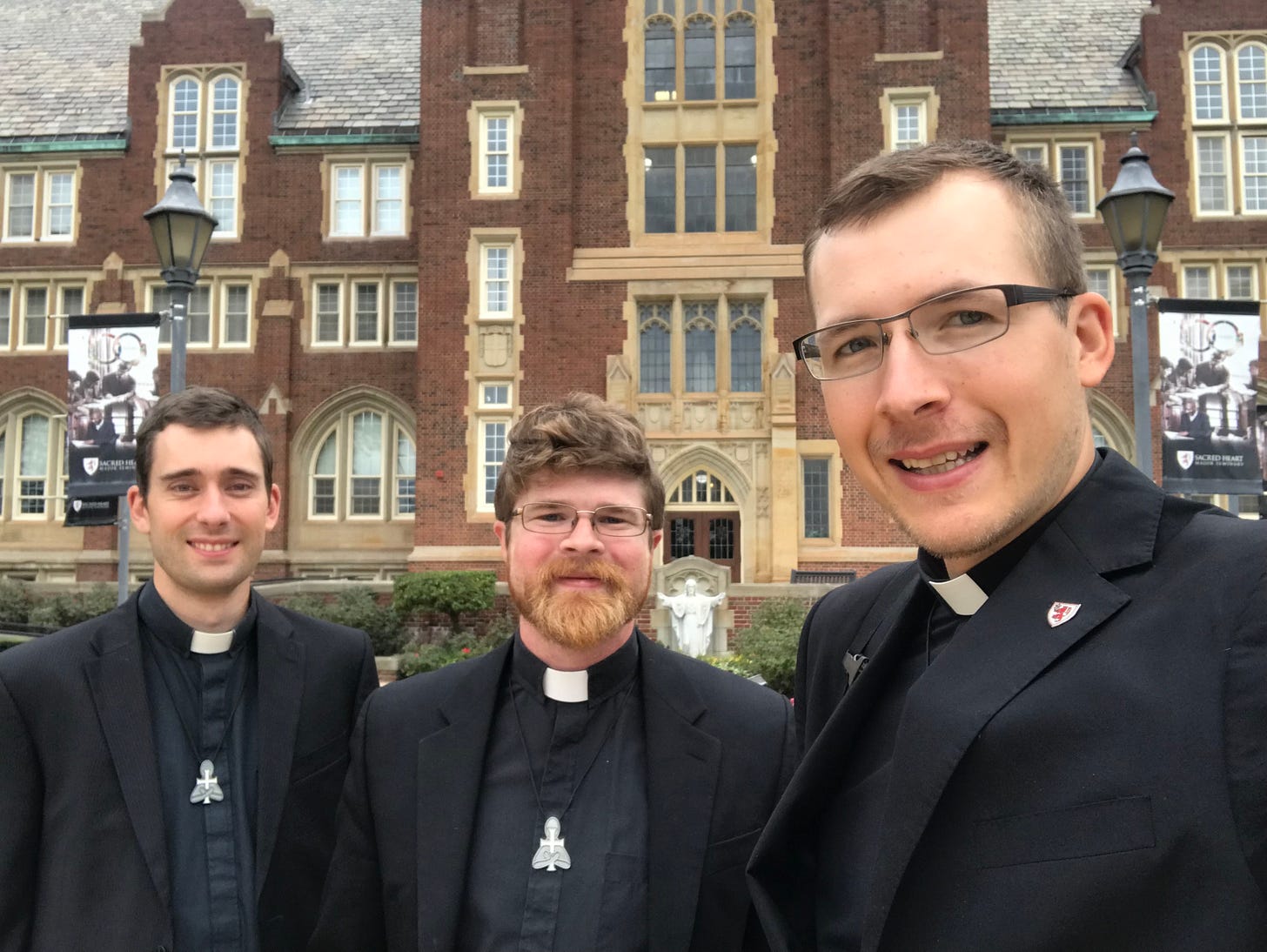On Accepting Compliments
The Monday Mystery Part 2: The Visitation (Luke 1:39-56)
And Mary said, “My soul magnifies the Lord…” (Luke 1:46)
Welcome to the second entry of Mystery Mondays. Each week I will write a reflection on a mystery (i.e. an episode in the life of Jesus or Mary) from the Rosary. My hope for this series is to provide fuel and inspiration for your own meditations. When you finish reading the reflection, I encourage you to do a ‘test run’ of the mystery by praying a decade of the Rosary (i.e. one Our Father, ten Hail Marys, and one Glory Be) while meditating on the mystery.
Seeing myself in a roman collar for the first time was surreal. At Sacred Heart Major Seminary, seminarians in the Theology program wear clerics to class and to diocesan functions. I see why they have us do this; looking like a priest is a striking reminder that one day, I will actually be a priest. What’s even more striking is being called ‘Father’ by people who understandably mistake me for a priest when I’m dressed this way. In our Field Education practicum this year, we did hospital visits. For the first semester I was told to wear clerics to my assignments. Naturally, many people assumed I was a priest. Sometimes I clarified that I was still a seminarian, but I couldn’t chase down everyone who made this mistake. One time, a lady I visited called me ‘Father,’ and I replied “thank you, ma’am, I’m actually not a priest yet, I’m still in seminary” to which she replied “oh ok, thank you Father.” On more than one visit, I simply had to accept that for this person and for the time being, I was now Father John.
Throughout my five years in formation I’ve had to come to terms with receiving deference and respect I don’t always feel I deserve. Early on I realized that right or wrong, like it or not, some people were going to treat me like a king the moment they learn I’m connected to the priesthood. I figured that the best I could do was to try to not be flagrantly unworthy of this treatment, and to carefully monitor the number of times I nodded my head in agreement with their continually escalating compliments. I often thought of Paul and Barnabas’ visit to Lystra. After they heal a crippled man, the crowd’s amazement reaches such a frenzied enthusiasm that they become convinced that Paul and Baranbas are gods, and begin to prepare a sacrifice. Paul and Barnabas are throughly dismayed:
The apostles Barnabas and Paul tore their garments when they heard this and rushed out into the crowd, shouting, “Men, why are you doing this? We are of the same nature as you, human beings… (Acts 14:14-15).
Of course, Paul and Barnabas were reacting against idolatry, not because they were self conscious about a compliment. But idolatry is itself a form of false and inappropriate complimenting. Imagine you are at a ceremony commemorating a firefighter who risked his life and sustained grievous injuries to rescue a family from a burning building. To your surprise and confusion, you observe the attendees give only a tepid golf clap for the firefighter. Then all of a sudden the emcee announces your name, and the crowd erupts into a raucous standing ovation. How would you respond? I know I would frantically signal my disapproval, and ask the crowd to sit down. At best, they’ve confused me for the real hero. At worst, they are irretrievably confused in how they measure who is worthy of how much praise. I think this scenario nicely illustrates what idolatry entails. As ridiculous and insulting as snubbing the firefighter in this way would be, it’s a hundred times worse when we commit idolatry; if we had a shred of dignity we would avoid it altogether.
Not all compliments are inappropriate or idolatrous. Some can and should be accepted. It would be entirely appropriate for the firefighter to acknowledge and accept the praise of the crowd. We might even forgive some light showboating. More often than not, heroes seem to want to downplay what they did. But whether or not heroes choose to receive the praise we give them, it is good - even necessary for us to give it. “What I did was no big deal” is tolerable (if not particularly credible) from the firefighter. “What he did was no big deal” is completely unacceptable from the community the firefighter served.
Realizing that it’s important for people to recognize and praise goodness has helped me become more comfortable with accepting compliments and praise from people inspired by my journey to the priesthood. Here and there I’ll get the odd person who goes overboard. But more and more I’m realizing that people are seeing and praising a good that deserves recognition in at least three ways:
First, my journey is a witness of hope for the vitality of the Church. During my time as a campus missionary with Catholic Christian Outreach, I once hosted a Bible study in the space we used for daily mass. An older lady who often dropped by for mass came in and sat down two rows behind us. I invited her to join in but she declined. We continued on, but after a few minutes I noticed that she was weeping. I asked her what was wrong, and she explained that she was overwhelmed and inspired to see young people involved in their faith. I was reminded of Jesus’ response Nathanael: “Do you believe because I told you that I saw you under the fig tree? You will see greater things than this” (John 1:50). I wanted to say to that woman, ‘you were moved to tears because you saw five college kids talking about the Bible in between Economics and Biology? You will see greater things than this.’
Indeed, if that was all it took to move her, she might have died and gone straight to heaven if she saw CCO’s annual conference, Rise Up, or FOCUS’s SEEK conference. I never got the chance to ask her more about her faith experience. But it’s a safe guess that it had been a long time since she’d seen anyone under forty care about their faith. Christianity has experienced a harrowing demographic collapse from the time she would have grown up. She could be forgiven for wondering if the Church would die out completely. How utterly discouraging and confusing that must have been for someone raised in the halcyon days of the Church in North America. When people learn that I am a young person who not only takes their faith seriously, but is willing to give up marriage and career to devote myself to becoming a priest, they are reminded in a similar way that (to paraphrase Mark Twain) the rumors of the Church’s demise are greatly exaggerated.
Secondly, apart from the Church’s dire demographic situation, people see and are inspired by the great gift of the ministerial priesthood. By their ordination, priests are specially configured to Christ in a way that allows them to become his direct instruments. When a priest speaks the words of absolution in confession, or the words of institution to confect the Eucharist, Christ is speaking those words through the priest. It is said that the priest lends his voice to Christ. While all are baptized into the priesthood of Christ, only the ministerial priests have this immense privilege and responsibility. While most people aren’t versed in the theological technicalities which describe this reality, I sense that many of the compliments I receive reflect an intuitive spiritual grasp of, and immense gratitude for it.
Finally, what todays mystery shows us is that, as many have pointed out, human glory does not compete with God’s glory. We often see people respond to praise by self consciously downplaying the good they have done. But when Elizabeth wholeheartedly compliments Mary, Mary wholeheartedly accepts. She does not deflect the praise, she reflects it onto God. She boldly declares “My soul magnifies the Lord.” A magnifying glass helps us to zoom in on something, and to see it in the finest grained detail. For those who want to get close to God, Mary is the ultimate magnifying glass. This is in part why St. Louis de Montfort wrote that “Mary is the safest, easiest, shortest, and most perfect way of approaching Jesus.”
Many have compared Mary to the moon. The moon does not give off any light on its own, and yet it is the brightest object in the sky, illuminating all the land. This shows the crucial importance of Mary in the life of every Christian. It also demonstrates the approach we should take for our own witness and example. God has given all of us gifts and a capacity to witness which are meant to be shared for his greater glory - to magnify him. If the moon wants to honor and magnify the sun, it should not self consciously retreat from the night sky. As Christians, if we want to magnify God, we should not prevent people from seeing and being edified by our witness and example. False modesty darkens the Earth. True humility magnifies the Lord.
As you do your ‘test run’ meditation on the Visitation, I encourage you to ponder what Mary meant when she said that her soul magnifies the Lord. How can you apply this to your own gifts and witness?



